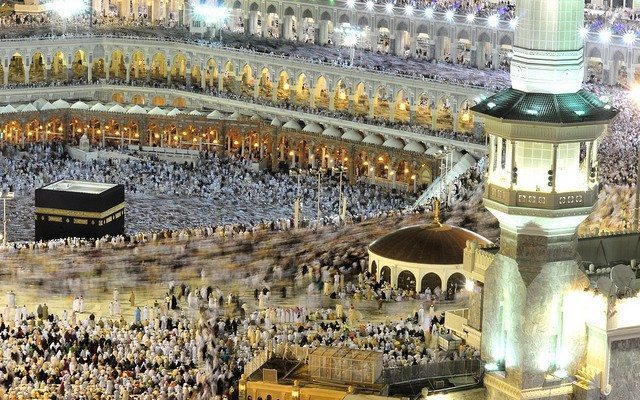 Image courtesy of [Al Jazeera English/Fadi El Binni via Flickr]
Image courtesy of [Al Jazeera English/Fadi El Binni via Flickr]
Law
Sharia Law: History and Modern Application
Sharia law can be confusing to many people outside of the Muslim community, mostly because of a combination of what we hear on the news, stereotypes, and what we are told by those practicing the Islamic faith. Find out more about what Sharia law is, as well as its parent religion Islam and its history.
What is Islam?
Islam is a monotheistic religion that was founded by the prophet Muhammad. The focus of Islam is the worship of God, or Allah in Arabic. Islam literally means “surrender” or “submission” and its practitioners are called Muslims, a term that means “one who submits.” The short video below gives a more in-depth understanding of the basics of it.
Islam came into being when Mohammad received a vision from Allah in 622 AD. It was first practiced in Mecca, where it was crushed, but it gained a foothold in the nearby town of Medina. Since then Islam has spread to all corners of the world with roughly 1,500,000,000 believers. Islam has different sects and branches. While the practices described in this piece are traditional, like any religion, every practicing Muslim has a different relationship with Islam.
How is Islam alike and different from Christianity and Judaism?
The biggest similarity between the three is that they are all monotheistic religions–each believes in one God. Islam broke off from the Judeo-Christian tradition and interprets events differently than Judaism and Christianity. For example, like Christianity, Islam believes in Abraham as its father, but differs from Christianity in its interpretation of which son of Abraham’s was the one for whom Allah would make a nation.
What are key points of Islam?
Islam has five key points, or pillars. According to the Cheadle Mosque:
Shahadah, profession of faith, is the first pillar of Islam. Muslims bear witness to the oneness of God by reciting the creed “There is no God but God and Muhammad is the Messenger of God.” This simple yet profound statement expresses a Muslim’s complete acceptance of and total commitment to Islam.
Salah, prayer, is the second pillar. The Islamic faith is based on the belief that individuals have a direct relationship with God. The world’s Muslims turn individually and collectively to Makkah, Islam’s holiest city, to offer five daily prayers at dawn, noon, mid-afternoon, sunset and evening. In addition, Friday congregational service is also required. Although salah can he performed alone, it is meritorious to perform it with another or with a group. It is permissible to pray at home, at work, or even outdoors; however it is recommended that Muslims perform salah in a mosque.”
Zakat, almsgiving, is the third pillar. Social responsibility is considered part of one’s service to God; the obligatory act of zakat enshrines this duty. Zakat prescribes payment of fixed proportions of a Muslim’s possessions for the welfare of the entire community and in particular for its neediest members. It is equal to 2.5 percent of an individual’s total net worth, excluding obligations and family expenses.
Sawm, fasting during the holy month of Ramadan, is the fourth pillar of Islam. Ordained in the Holy Qur’an, the fast is an act of deep personal worship in which Muslims seek a richer perception of God. Fasting is also an exercise in self-control whereby one’s sensitivity is heightened to the sufferings of the poor.Ramadan, the month during which the Holy Qur’an was revealed to the Prophet Muhammad, begins with the sighting of the new moon, after which abstention from eating, drinking and other sensual pleasures is obligatory from dawn to sunset. Ramadan is also a joyful month. Muslims break their fast at sunset with a special meal, iftar, perform additional nocturnal worship, tarawih, after evening prayer; and throng the streets in moods that are festive and communal. The end of Ramadan is observed by three days of celebration called Eid Al-Fitr, the feast of the breaking of the fast. Customarily, it is a time for family reunion and the favored holiday for children who receive new clothing and gifts.
Hajj, the pilgrimage to Makkah, is the fifth pillar and the most significant manifestation of Islamic faith and unity in the world. For those Muslims who are physically and financially able to make the journey to Makkah, the Hajj is a once in a lifetime duty that is the peak of their religious life. The Hajj is a remarkable spiritual gathering of over two million Muslims from all over the world to the holy city. In performing theHajj, a pilgrim follows the order of ritual that the Prophet Muhammad performed during his last pilgrimage.
What is Sharia Law?
Sharia law is a comprehensive set of regulations that pertain to marriage, divorce, inheritance, and custody, as well as daily routines, familial and religious obligations, and financial dealings for all practicing Muslims. Sharia, or Islamic law, influences the legal code in most Muslim countries making it the go-to for any and all questions that many Muslims have on any subject with regard to their daily and spiritual lives.

The Qur’an, the holy book of Islam. Image courtesy of Mattia Belleti via Flickr
What provides the basis for Sharia Law?
There are three sources from which Sharia laws take form. They are the Qur’an, which is the Muslim holy book, the Hadith, which is the sayings and conduct of the prophet Muhammad, and the fatwas, which are the rulings of Islamic scholars.
The Qur’an, pictured above, is the word of Allah, in the way that the Bible is the word of God in Christianity. The Qur’an differs from the Bible in many ways. One of the main differences is that unlike the Bible, which is translated in many different languages, the Qur’an is not. This is because in Islam non-Arabic versions of the Qur’an are considered to be interpretations of the Qur’an and unless the original Arabic verses are embedded on the page alongside the translation, it cannot technically be called a Qur’an.
The Hadith is a series of four books that talk about the sayings of the Prophet Muhammad as well as his conduct. The Hadith covers, quite literally, everything that Muhammad did or said, including details on what to do for public matters such as drinking water, eating, and sleeping, to more private matters such as bathroom habits and sex.
A Fatwa is an “Islamic legal pronouncement issued by an expert in religious law also called a Mufti, pertaining to a specific issue, usually at the request of an individual or judge to resolve an issue where Islamic jurisprudence, also called fiqh, is unclear.” A Fatwa is not binding as is the verdict of a secular court, such as the United States Supreme Court, even though it is considered to be applicable to all members of the Muslim Faith; it all comes to down to the individual to decide if he or she wants to respect the ruling or not. An example of a Fatwa is one that was passed in 1983 forbidding vasectomies, tubectomies, and all forms of abortion.
The list below shows the qualifications that Mufti must have to be able to give a Fatwa:
Know the verses of Qur’ān pertaining to the ruling at hand;
Know the reason behind the verses of Qur’ān related to the ruling – when each was revealed and why;
Distinguish the supportive and oppositional verses of the Qur’ān;
Know all the hadith pertaining to the ruling and the soundness of their chain of transmission;
Be familiar with the legal precedents of the issue before him, including the arguments or consensus reached by earlier scholars; and
Be well-versed in the syntax, grammar, pronunciation, idioms, special linguistic uses, customs and culture prevalent at the time of the Prophet (s) and succeeding two generations.
Anyone who issues a Fatwa that is not qualified according to the standards set above has broken the commands as set out by Muhammad’s successor Umar and is subject to punishment. To some Muslims, these unqualified groups would also include any radical extremist groups.
Where is Sharia Law mostly to be found?
Thirty-five countries currently incorporate Sharia into their civil, common, or customary law; however, they enact the laws very differently. For example, Indonesia, Egypt, Turkey, and Morocco all use Sharia as a primary source of law and do not allow for the stoning or mutilation of people for crimes. On the flip-side, more hard-line Islamic states such as Iran, Saudi Arabia, Sudan, and Somalia do allow for them, but they are rarely used or enforced.
What are examples of Sharia Law?
The main examples that the Western World hears about are called Hadd offenses, which are unlawful sexual intercourse including sex outside of marriage and adultery, false accusation of unlawful sexual intercourse, drinking certain types of alcohol, theft, and highway robbery. These five crimes can be punished in one of the following five ways: flogging, stoning, amputation, exile, or execution. These forms of punishment may also be turned into public spectacles. The reason for this is to serve as a deterrent for others who may be thinking about committing the same crime. There are other ways to break Sharia Law with different punishments or policies attached.
How is Sharia Law applied in secular nations?
That is a debatable question that has been raging for the last decade. Here is how Sharia Law has been used in a few different secular nations.
Britain
According to the BBC:
In two important areas British law has incorporated religious legal considerations. British food regulations allow meat to be slaughtered according to Jewish and Islamic practices – a touchstone issue for both communities.
Secondly, the Treasury has approved Sharia-compliant financial products such as mortgages and investments. Islam forbids interest on the basis that it is money unjustly earned. These products are said by supporters to meet the needs of modern life in a way that fits the faith.
America
Sharia law has entered into some state court decisions, usually to do with personal disputes. An example of this is a case that happened in the state of New Jersey where a woman filed for divorce on the basis that her husband had left her. The husband cited Pakistani law, which follows Sharia, claiming that New Jersey had no right to interfere. The trial court agreed with the wife and ordered the husband to pay spousal maintenance; however, the Appellate Court overturned the ruling based on the fact that the couple’s Islamic pre-marital agreement did not provide for spousal maintenance and did not allow the wife to take an interest in the husband’s property.
Conclusion
Sharia Law is a collection of laws that dictate order to Islamic societies. Many Muslims who wish to be true to the commands of Allah attempt to follow these laws as best as they can. Although there’s a lot of misinformation out there, Sharia Law’s applications depend on the circumstances, nation, and individual.
Resources
Primary
Islamic Supreme Court of America: What is a Fatwa?
Additional
Council on Foreign Relations: Islam: Governing Under Sharia
JRank: Comparative Criminal Law Enforcement Islam
Editor’s Note: This post has been updated to credit select information to BBC.








Comments